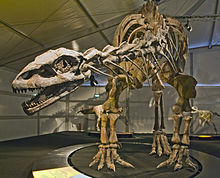Lessemsauridae is a clade of early sauropodiform dinosaurs that lived in the Triassic and Jurassic of Argentina, South Africa and possibly Lesotho. A phylogenetic analysis performed by Apaldetti and colleagues in 2018 recovered a new clade of sauropodiforms uniting Lessemsaurus, Antetonitrus, and Ingentia which they named Lessemsauridae. It is a node-based taxon, defined as all descendants of the most recent common ancestor of Lessemsaurus sauropoides and Antetonitrus ingenipes.[1] Depending on the definition of Sauropoda, Lessemsauridae is either one of the most basal sauropod taxa, or a sister taxon of Sauropoda. An additional member of the clade was named later in 2018, Ledumahadi.[2] A 2021 study by Pol and colleagues also assigned the genera Kholumolumo and Meroktenos to the group.[3]
| Lessemsaurids | |
|---|---|

| |
| Skeletal mount of Lessemsaurus | |
| Scientific classification | |
| Domain: | Eukaryota |
| Kingdom: | Animalia |
| Phylum: | Chordata |
| Clade: | Dinosauria |
| Clade: | Saurischia |
| Clade: | †Sauropodomorpha |
| Clade: | †Sauropoda |
| Clade: | †Lessemsauridae Apaldetti et al., 2018 |
| Genera | |
Description
editLessemsaurids were quadrupeds. Unlike later sauropods, which had columnar limbs, the forelimbs of lessemsaurids were flexed.[2] Sauropodomorph trackways have been found with widely-spaced front feet, indicating they were made by a trackmaker with flexed forelimbs as in lessemsaurids.[4]
Lessemsaurids could reach large sizes, with Lessemsaurus estimated to have reached a mass of 7 tonnes[1] and the later Ledumahadi estimated to have reached a mass of 12 tonnes.[2]
They had highly pneumatic cervical and dorsal vertebrae, very antero-posteriorly short but tall cervical vertebrae, robust cervicals, a very expanded distal scapula blade, and upright arms.[1][2]
Evolution and biogeography
editLessemsaurids first appeared during the middle Norian age of the Triassic. A specimen of an unnamed lessemsaurid from the Elliot Formation of South Africa probably dates to approximately 218 million years ago.[5] Lessemsaurus is a member of the La Esquina Local Fauna,[3] which probably dates to at least 213 million years ago.[6] Antetonitrus and Ledumahadi are found in the Upper Elliot Formation, which dates to the Hettangian and Sinemurian ages of the Jurassic.[7] Lessemsaurids are known from South Africa and Argentina.
References
edit- ^ a b c Apaldetti, C.; Martínez, R. N.; Cerda, I. A.; Pol, D.; Alcober, O. (2018). "An early trend towards gigantism in Triassic sauropodomorph dinosaurs" (PDF). Nature Ecology & Evolution. 2 (8): 1227–1232. Bibcode:2018NatEE...2.1227A. doi:10.1038/s41559-018-0599-y. hdl:11336/89332. PMID 29988169. S2CID 49669597.
- ^ a b c d McPhee; et al. (2018). "A Giant Dinosaur from the Earliest Jurassic of South Africa and the Transition to Quadrupedality in Early Sauropodomorphs". Current Biology. 28 (19): 3143–3151.e7. doi:10.1016/j.cub.2018.07.063. PMID 30270189.
- ^ a b Pol, Diego; Otero, Alejandro; Apaldetti, Cecilia; Martínez, Ricardo N. (2021-01-11). "Triassic sauropodomorph dinosaurs from South America: The origin and diversification of dinosaur dominated herbivorous faunas". Journal of South American Earth Sciences. 107: 103145. Bibcode:2021JSAES.10703145P. doi:10.1016/j.jsames.2020.103145. ISSN 0895-9811. S2CID 233579282.
- ^ Sciscio, Lara; Bordy, Emese M.; Lockley, Martin G.; Abrahams, Miengah (2023-09-28). "Basal sauropodomorph locomotion: ichnological lessons from the Late Triassic trackways of bipeds and quadrupeds (Elliot Formation, main Karoo Basin)". PeerJ. 11: –15970. doi:10.7717/peerj.15970. ISSN 2167-8359. PMC 10542822. PMID 37790620.
- ^ Moopen, Atashni; Viglietti, Pia A; Choiniere, Jonah N (2023-12-15). "Anatomy and phylogenetic relationships of a possible lessemsaurid with associated plant fossils from the lower part of the Elliot Formation". Palaeontologia Africana. 56: 190–212.
- ^ Kent, Dennis V.; Santi Malnis, Paula; Colombi, Carina E.; Alcober, Oscar A.; Martínez, Ricardo N. (2014-06-03). "Age constraints on the dispersal of dinosaurs in the Late Triassic from magnetochronology of the Los Colorados Formation (Argentina)". Proceedings of the National Academy of Sciences. 111 (22): 7958–7963. Bibcode:2014PNAS..111.7958K. doi:10.1073/pnas.1402369111. PMC 4050597. PMID 24843149.
- ^ Viglietti, P.A.; McPhee, B.W.; Bordy, E.M.; Sciscio, L.; Barrett, P.M.; Benson, R.B.J.; Wills, S.; Chapelle, K.E.J.; Dollman, K.N.; Mdekazi, C.; Choiniere, J.N. (2020-06-01). "Biostratigraphy of the Massospondylus Assemblage Zone (Stormberg Group, Karoo Supergroup), South Africa". South African Journal of Geology. 123 (2): 249–262. Bibcode:2020SAJG..123..249V. doi:10.25131/sajg.123.0018. eISSN 1996-8590. ISSN 1012-0750. S2CID 225859330. Retrieved 2021-02-17.